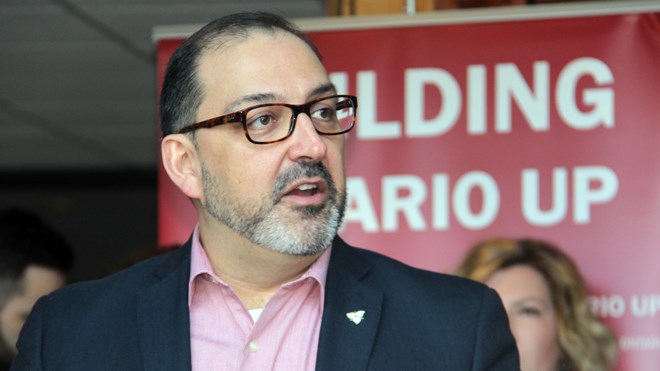The pre-election rhetoric is heating up at Queen's Park, where a Tory MPP was forced to withdraw a comment Monday aimed at Sudbury MPP Glenn Thibeault, accusing Thibeault of lying.
At issue is the Liberal government's Fair Hydro Plan, introduced last year to reduce hydro bills by 25 per cent. In a report released last spring, Ontario Auditor General Bonnie Lysyk wrote that the complicated accounting procedures will add an extra $4 billion in costs to the plan, on top of the almost $40 billion it will cost taxpayers by 2028.
In response, Thibeault, who is the province's energy minister, said that accounting firms such as KPMG and Deloitte LLP signed off on the plan, and it was a matter of accountants having a disagreement over accounting practices. He also said several provinces and U.S. states use the same accounting practices.
On Monday, however, Ontario PC Energy Critic Todd Smith accused Thibeault of lying to the House. He cited a letter Lysyk wrote to the Standing Committee on Public Accounts on April 11.
“Deloitte LLP and Ernst & Young LLP have confirmed to us that they provided no formal opinions approving the accounting for the Fair Hydro Plan that the government planned to use for its consolidated financial statements,” the letter said. “KPMG told us that it has not provided an opinion on the accounting for the Fair Hydro Plan in the government’s consolidated financial statements.”
“Why is he lying to the House?” Smith said.
“Withdraw, Mr. Speaker,” Smith said, moments later, when reprimanded by Speaker Dave Levac.
In an email, a spokesperson for Thibeault said the accounting firms in question “have all reviewed and provided an opinion on the accounting in one form or another.”
In the email, Thibeault said the Tories actually supported the Fair Hydro Plan, until the party turfed its leader, Patrick Brown, earlier this year.
“The Conservatives voted against our plan to reduce electricity rates for families, and then sneakily included the Fair Hydro Plan in the People’s Guarantee, their now obsolete platform,” Thibeault said. “They have since turned their backs on the Fair Hydro Plan, without replacing it with any kind of real policy to address electricity affordability.
“In developing the Fair Hydro Plan we consulted extensively and thoughtfully with accounting experts within government, the Provincial Controller, government agencies including the Independent Electricity System Operator and Ontario Power Generation, as well as external legal and accounting experts. By doing our due diligence we were able to deliver a plan that reduced costs for Ontario ratepayers, while ensuring fairness in our electricity system.”
The email also included statements from KPMG and Deliotte:
Statement from KPMG
We would like to highlight two key points: The concerns referred to by the AGO result from a difference of professional judgement. Secondly, KPMG has been transparent with the AGO and made every effort to be responsive to the AGO’s requests for meetings and information.
The concerns referred to by the AGO result from a difference of professional judgement. The AGO has taken issue with an accounting standard and in the way the standard is being applied. The standards for public sector organizations such as IESO are principles based standards and, accordingly, require the exercise of considerable professional judgement. In many cases, there is more than one acceptable approach that is compliant with the applicable standards.
On the basis of our extensive research, deliberations and an opinion from another major accounting firm, we believe that the accounting policies adopted by IESO are in accordance with Canadian public sector accounting standards.
KPMG has been transparent with the AGO, and made themselves fully available to consider the concerns raised by the AGO. The AGO was aware of all changes to the accounting policies of the IESO in March of 2017, which was more than four months before the completion of their audit of the Province.
KPMG and IESO have made every effort to be responsive to the AGO's requests for meetings and information and have repeatedly invited the AGO to provide any input she feels relevant, all of which has been carefully considered by KPMG.
We appreciate the importance of this matter, and believe that the concerns expressed by the AGO result from a difference of opinion in the application of professional judgement.
- KPMG Canada
Statement from Deloitte
KPMG is the auditor of the IESO. Deloitte was engaged by KPMG to provide its opinion (the “Deloitte Report”) on whether a public sector entity could use rate regulated accounting under Canadian Public Sector Accounting Standards (“PSAS”), as established by CPA Canada.
PSAS are silent on the question of how to account for the impacts of rate regulation. Through an analysis of the guidance provided in PSAS, the Deloitte Report concluded that it is appropriate for a public sector entity to select accounting policies that would result in the recognition of the impacts of rate regulation, by analogy to U.S. accounting standards and the related eligibility criteria on the topic. The Deloitte report further concluded that any regulatory assets and liabilities recognized through the appropriate application of these policies would meet the criteria for recognition under PSAS.
It should be noted, however, that the Deloitte Report did not include in its scope an assessment of the specific regulatory assets or liabilities recognized by the IESO through the application of this accounting policy under PSAS.
- Deloitte, LLP.
